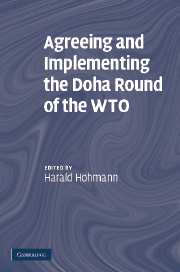Book contents
- Frontmatter
- Contents
- List of Contributors
- Foreword
- Introduction
- The future of the Doha Round
- 1a Doha a posteriori
- 1b The future of the Doha Round after suspension in Geneva and deadlock in Potsdam: Is it all in vain?
- PART ONE Development policy of the WTO
- PART TWO Trade policy (including competition) and trade facilitation
- PART THREE Reform of the dispute settlement system
- PART FOUR Social rights, health, and environment
- PART FIVE Conclusions
- Index
1b - The future of the Doha Round after suspension in Geneva and deadlock in Potsdam: Is it all in vain?
from The future of the Doha Round
Published online by Cambridge University Press: 23 February 2010
- Frontmatter
- Contents
- List of Contributors
- Foreword
- Introduction
- The future of the Doha Round
- 1a Doha a posteriori
- 1b The future of the Doha Round after suspension in Geneva and deadlock in Potsdam: Is it all in vain?
- PART ONE Development policy of the WTO
- PART TWO Trade policy (including competition) and trade facilitation
- PART THREE Reform of the dispute settlement system
- PART FOUR Social rights, health, and environment
- PART FIVE Conclusions
- Index
Summary
The Doha Development Agenda (DDA) round of negotiations was suspended across the board de facto and sine die at the informal meeting of the Trade Negotiations Committee (TNC) on 24 July 2006. The General Council noted the suspension on 27 July. A ‘soft resumption’ was initiated at the technical level of trade negotiators on 16 November 2006. Full scale negotiations resumed in a so called ‘hard resumption’, based on political commitments emerging from a WTO Mini-Ministerial Meeting on the margins of the Davos World Economic Forum on 27 January 2007. But even with ‘full scale’ resumption, multilateral negotiating engagement was in slow motion and limbo until April 2007, as Members waited for the exploratory contacts amongst the G4 (Brazil, EU, India and US) to yield results and provide impetus for a breakthrough in modalities for agriculture and industrial products. The G4 process itself, however, ended in deadlock and failure at their Ministerial Meeting in Potsdam, Germany, on 21 June 2007. Prior to this past sequence of ‘crisis, suspension and resumption’ and ‘G4 deadlock, failure and multilateral resumption’, the broad pattern of progress in the Doha Round has been its fitful, uncertain and fluctuating evolution (see the Annex to this chapter – DDA Negotiations: ‘Calendar of key events’). Neither the suspension nor the G4 Potsdam deadlock and failure will transform the state of the negotiations into rigor mortis. The fluctuating pattern of progress and setback is in the nature of trade negotiations.
Information
- Type
- Chapter
- Information
- Agreeing and Implementing the Doha Round of the WTO , pp. 16 - 38Publisher: Cambridge University PressPrint publication year: 2008
